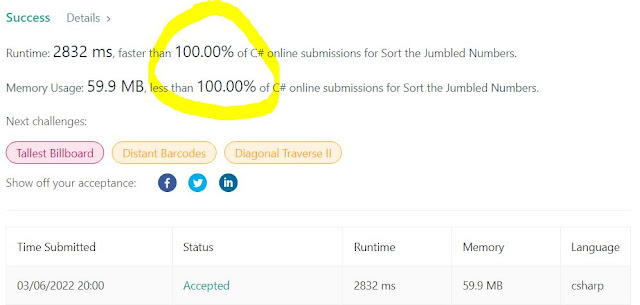The power and simplicity of IComparer II
I tried solving this problem with a bubble-sort, but it led to TLE. Then the solution again is to implement an IComparer interface. The only caveat here is that we need to have a hash table mapping available to the IComparer, which can be done with a static variable inside the Solution class. Code is down below, cheers, ACC.
2191. Sort the Jumbled Numbers
Medium
You are given a 0-indexed integer array mapping which represents the mapping rule of a shuffled decimal system. mapping[i] = j means digit i should be mapped to digit j in this system.
The mapped value of an integer is the new integer obtained by replacing each occurrence of digit i in the integer with mapping[i] for all 0 <= i <= 9.
You are also given another integer array nums. Return the array nums sorted in non-decreasing order based on the mapped values of its elements.
Notes:
- Elements with the same mapped values should appear in the same relative order as in the input.
- The elements of
numsshould only be sorted based on their mapped values and not be replaced by them.
Example 1:
Input: mapping = [8,9,4,0,2,1,3,5,7,6], nums = [991,338,38] Output: [338,38,991] Explanation: Map the number 991 as follows: 1. mapping[9] = 6, so all occurrences of the digit 9 will become 6. 2. mapping[1] = 9, so all occurrences of the digit 1 will become 9. Therefore, the mapped value of 991 is 669. 338 maps to 007, or 7 after removing the leading zeros. 38 maps to 07, which is also 7 after removing leading zeros. Since 338 and 38 share the same mapped value, they should remain in the same relative order, so 338 comes before 38. Thus, the sorted array is [338,38,991].
Example 2:
Input: mapping = [0,1,2,3,4,5,6,7,8,9], nums = [789,456,123] Output: [123,456,789] Explanation: 789 maps to 789, 456 maps to 456, and 123 maps to 123. Thus, the sorted array is [123,456,789].
Constraints:
mapping.length == 100 <= mapping[i] <= 9- All the values of
mapping[i]are unique. 1 <= nums.length <= 3 * 1040 <= nums[i] < 109
public class Solution
{
public static Hashtable jumbledMap = null;
public class MyComparerJumbled : IComparer
{
public int Compare(Object x, Object y)
{
long xl = (long)Solution.jumbledMap[x];
long yl = (long)Solution.jumbledMap[y];
return xl.CompareTo(yl);
}
}
public int[] SortJumbled(int[] mapping, int[] nums)
{
Solution.jumbledMap = new Hashtable();
foreach (int n in nums)
{
string mappedTo = "";
int temp = n;
if (temp == 0)
{
if (!jumbledMap.ContainsKey(temp)) jumbledMap.Add(temp, (long)mapping[temp]);
}
else
{
while (temp > 0)
{
int index = temp % 10;
mappedTo = mapping[index].ToString() + mappedTo;
temp /= 10;
}
if (!jumbledMap.ContainsKey(n)) jumbledMap.Add(n, Convert.ToInt64(mappedTo));
}
}
Array.Sort(nums, new MyComparerJumbled());
return nums;
}
}




Comments
Post a Comment